Last Updated on June 18, 2023
The decision between a heat pump water heater and an oil water heater is complicated if you’re looking for a new water heater. Understanding the fundamental workings of each type is essential to make an informed decision.
Heat pump water heaters utilize electricity to move heat from the ground or air into the water tank for heating water. On the other hand, oil water heaters employ oil burning to heat the water. While both water heaters can supply hot water, they have some marked differences.
Here, we’ll discuss these differences in more detail to enable you to select the most suitable type of water heater that suits your needs.
The Differences Between Heat Pump Water Heater vs Oil

When you compare the two types of water heaters, you’ll find distinct differences between them. Here are the most important ones:
- No 01: Energy Source
- No 02: Efficiency
- No 03: Environmental Impact
- No 04: Cost
- No 05: Maintenance and Lifespan
- No 06: Availability and Infrastructure
No 01: Energy Source
Each system’s energy source differs, with one relying on oil and the other utilizing the surrounding air, ground, or water. An oil heater requires oil to generate heat, which is expensive and potentially harmful to the environment.
In contrast, a heat pump water heater uses electricity to extract heat from the air, ground, or water, making it a more efficient and environmentally friendly option.
To better understand the differences in energy sources between a heat pump water heater and an oil heater, consider the following bullet points:
- Oil heaters use oil to generate heat, which can be costly and require frequent refills.
- Heat pump water heaters utilize the surrounding environment as a heat source, making them more cost-effective and sustainable.
- The use of oil as an energy source can contribute to air pollution and greenhouse gas emissions, while heat pump water heaters produce no direct emissions.
- Heat pumps may be a more practical option in areas with limited access to oil or high electricity costs.
No 02: Efficiency
When you compare it to a heat pump water heater, you’ll be surprised at how much money and energy you can save with an oil heater. While heat pump water heaters are highly efficient, they can be quite expensive to purchase and install.
This is because some of the energy generated by burning oil is lost through combustion and exhaust gasses.
Also, oil heaters require a steady supply of fuel to operate, which can lead to higher monthly bills.
No 03: Environmental Impact
Regarding environmental impact, heat pump water heaters are the clear winner over oil heaters. Heat pump water heaters rely on renewable heat sources, such as ambient air or geothermal energy, while oil heaters release air pollution and greenhouse gasses when they burn fuel.
Burning oil releases carbon dioxide (CO2), sulfur dioxide (SO2), and nitrogen oxide (NOx) into the atmosphere, which are all harmful to the environment.
In contrast, heat pump water heaters produce fewer greenhouse gas emissions, making them a more environmentally friendly choice.
No 04: Cost
You should consider each option’s efficiency and operating costs for your home’s hot water system when balancing upfront costs with long-term savings.
In terms of cost, oil heaters tend to have lower upfront expenses but can become more expensive to operate over time. This is due to the cost of oil, which can fluctuate and increase significantly during colder months when the demand for heating is high.
Also, oil heaters are not as energy-efficient as heat pump water heaters, resulting in higher electricity bills and overall operating costs.
On the other hand, heat pump water heaters may have a higher upfront cost but are more energy-efficient, resulting in long-term cost savings on electricity bills.
These types of heaters work by extracting heat from the air and transferring it to the water rather than generating heat through combustion like oil heaters. This method is not only more efficient but also more environmentally friendly since it reduces greenhouse gas emissions.
No 05: Maintenance and Lifespan

Don’t forget to consider maintenance and lifespan when deciding between an oil heater and a heat pump water heater.
While heat pump water heaters require less maintenance compared to oil heaters, they also have a longer lifespan. This means you won’t have to worry about replacing your heat pump water heater as often as you would with an oil heater.
Heat pump water heaters also have fewer components prone to wear and tear, making them a more reliable and cost-effective option in the long run.
On the other hand, oil heaters may require more maintenance, such as regular cleaning and inspection of the combustion system. This can be time-consuming and costly, as you’ll need to hire a professional to perform these tasks.
Also, oil heaters have a shorter lifespan than heat pump water heaters, so you may need to replace them more frequently. This can be a significant expense that you may not have anticipated.
No 06: Availability and Infrastructure
Heat pump water heaters require suitable conditions for heat extraction, such as available air, ground, or water. A heat pump water heater may not be the best option when living in an area with limited access to these resources.
Alternatively, if your area has ample resources, a heat pump may be a more sustainable and energy-efficient choice.
Oil heaters require a supply of oil, either through a tank or a direct oil line. They are commonly found in areas with access to oil delivery services and suitable storage facilities.
An oil heater may be a practical choice if you live in an area with easy access to oil delivery and storage. In any case, an oil heater may not be a feasible option if you do not have access to these resources.
Comparison Table between Heat Pump Water Heater and Oil
| Aspect | Heat Pump Water Heater | Oil Heater |
| Energy Source | Electricity | Oil |
| Efficiency | Highly efficient | Less efficient |
| Environmental Impact | Environmentally friendly | Contributes to pollution |
| Cost | Higher upfront cost | Lower upfront cost |
| Maintenance | Requires less maintenance | Requires more maintenance |
| Lifespan | Longer lifespan | Shorter lifespan |
| Availability | Requires electrical power and suitable heat source | Requires oil supply and storage facilities |
Why do heat pumps not work in a very cold climate?

When the freezing winds of winter whip through your neighborhood, it’s tough for any machine to extract warmth from the frigid air. This is why heat pumps do not work as well in very cold climates.
Heat pumps work by extracting heat from the outside air, but when the temperature drops below a certain point, there isn’t enough heat in the air for the heat pump to work effectively.
In order to overcome this problem, some heat pump water heaters have a backup heating element that kicks in when the temperature drops too low. This ensures that you always have hot water, even on the coldest days.
Do heat pump water heaters work as direct replacements for oil water heaters?
Heat pump water heaters use electricity to transfer heat from the surrounding air to heat water, making them an energy-efficient alternative to oil water heaters. This makes them an excellent option for homeowners who want to reduce their energy bills and environmental impact.
The following factors should be taken into consideration before switching from oil to heat pump.
- Heat pump water heaters require a dedicated electrical circuit, so you’ll need to ensure that your electrical system can accommodate this.
- You’ll need enough space to install a heat pump water heater, as they are larger than oil water heaters.
- Heat pump water heaters have a higher upfront cost than oil water heaters, but the energy savings can offset this.
Are heat pump water heaters quieter than oil water heaters?
You may be pleasantly surprised to find that the gentle hum of a heat pump water heater will lull you into a peaceful state, making it a quieter option for your home.
Heat pump water heaters operate using a refrigeration cycle involving a compressor and a fan. The compressor compresses the refrigerant gas, which heats up and then flows into a heat exchanger, where it heats up the water. The fan helps to circulate the air over the heat exchanger.
In contrast to this, oil water heaters use a burner to heat up the water. The burner is fueled by oil and creates a flame to heat up the water. This process is quite loud, depending on the burner type and the oil quality.
Upgrade to a Heat Pump Water Heater Today and Save Big on Energy Bills
Opting for a heat pump water heater over an oil water heater is wise. It is not just for the environment but for your wallet too.
On average, heat pump water heaters use about 60% less energy than their oil counterparts, which translates to significant savings on energy bills. Heat pumps emit fewer greenhouse gasses, making them a more sustainable choice.
Also, Heat pumps have a longer lifespan and require fewer maintenance checks, adding up to more significant long-term cost savings.
By choosing a heat pump water heater, you’re investing in a more efficient and eco-friendly solution that ensures a healthier world for generations to come.



